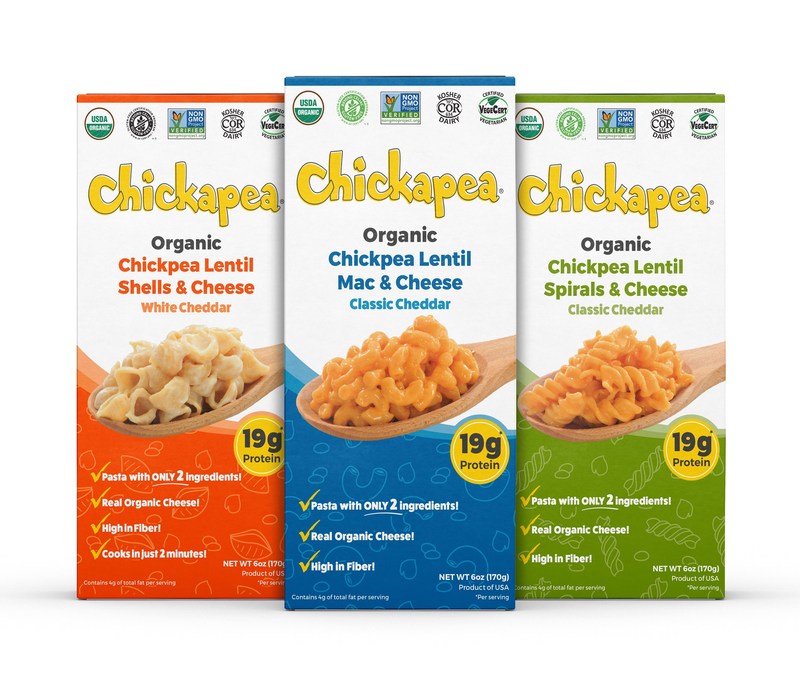Collingwood, Ontario-based company Chickapea, has launched the first-ever line of organic, pulse-based mac and cheese products. These products come in three varieties (mac with classic cheddar, mini spirals with classic cheddar and shells with white cheddar) and contain 19 grams of protein, eight grams of fibre and less than 500 mg of sodium per serving.
The Canadian company gained popularity in the grocery space with their two-ingredient pasta products made from chickpeas and lentils in 2016. Since their launch in July of that year, Chickapea products are now available in over 2,000 retailers across North America as well as online. The company’s new certified organic, non-GMO, kosher, vegetarian and gluten-free mac and cheese products have potential because of their nutritional qualities.
“We’re so excited to bring Chickapea Mac and Cheese to market,” says Shelby Taylor, founder and CEO at Chickapea. “It’s packed full of nutrients and tastes like the cheesy traditional comfort food we all love and grew up on. Our mission at Chickapea is to make healthy eating simple, convenient and delicious by reinventing comfort foods with only nutritious, organic ingredients. We believe you can have your mac and cheese and eat it too.”
Chickapea’s mac and cheese products are already available in Canadian stores and are set to be launched in the US later this spring with food distributors KeHE and UNFI . The company also plans on attracting more retail partners at the upcoming Natural Products Expo West in Anaheim, California which runs between March 8-10.
Chickapea’s organic certification may help the brand in accumulating sales in North America. A recent report by the Canada Organic Trade Association found that the total organic market in the country (including non-food and food items) is estimated to be valued at $5.4 billion, which is a $1.9 billion increase from 2012. The organic food and beverage segment accounted for $4.4 billion alone, which is a significant increase from the $2.8 billion in 2012. With the compound annual growth rate of the total organic market in Canada estimated at 8.7 percent between 2012 and 2017, this segment is proving to be valuable for the Canadian food industry.
“Canada’s organic sector remains on its upward trajectory, gaining new market share as consumers across Canada ate and used more organic products than ever before,” says Tia Loftsgard, Executive Director of the Canada Organic Trade Association. “It is an exciting time to be a part of a sector that shows such promise to bring positive economic, social and environmental change to Canada.”
However, The US market for organic products yields much more potential profits for the company. According to Statista, the US is the biggest single consumer market in the world for organic products, with 44 percent of Americans claiming to actively include organic foods in their diets. The Organic Trade Association found that over 82 percent of American households buy organic products, registering in at about $50 billion in annual sales.
These large profits have led many major players in the food industry to invest in the organic segment which could mean competition for Chickapea. Earlier this month, CPG giant Nestlé bought a majority stake in organic food company Terrafertil, and in 2017 they acquired organic tea maker Pukka Herbs. Aldi, the rapidly expanding grocery store chain, has invested a lot of money in their organic private label brands as well.
However, Chickapea stands out in the organic space with their innovative lentil-based pasta products. By transforming a fan-favorite food item into a healthy meal option, the company is able to appeal to traditional mac and cheese lovers as well as health-focused consumers. According to a Technavio food and beverage market intelligence report, the best way to stand out in the growing organic market is by producing unique and innovative products.
“Due to the presence of a number of small and international brands, the organic food and beverages market is experiencing high competition. To maintain market share and customer base, vendors are trying to launch innovative food products. Manufacturers are developing new varieties of organic food by formulating new ingredient combinations, and flavors,” said Manjunath Reddy, a lead analyst for food at Technavio.












Join or login to leave a comment
JOIN LOGIN